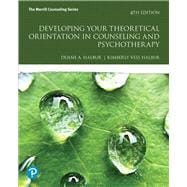Appropriate for mental health counselors, psychologists, social workers, school counselors, substance abuse counselors, psychotherapists, and peer helpers, Developing Your Theoretical Orientation in Counseling and Psychotherapy helps readers find a theoretical orientation aligned with their personal values and worldview. Theories are presented in the text in a way that allows the reader to identify quickly the philosophical and cultural foundations of the theories while also accessing the theories’ goals and techniques.
The 4th Edition is updated to include, among other things, a deeper discussion of the implications of empirically validated treatments and a new review of the implications of common-factor approaches.











